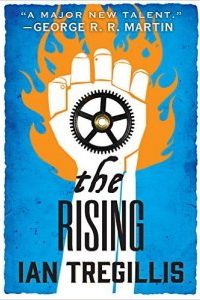Gary K. Wolfe and Liz Bourke Review A Master of Djinn by P. Djèlí Clark
 A Master of Djinn, P. Djèlí Clark (Tordotcom 978-1250267689, $ 27.99, 400pp, hc) May 2021. Cover by Stephan Martiniere.
A Master of Djinn, P. Djèlí Clark (Tordotcom 978-1250267689, $ 27.99, 400pp, hc) May 2021. Cover by Stephan Martiniere.
The notion of magic returning to the world has been a familiar trope for so long that it’s nearly become part of the performance repertoire of fantasy writers, like locked-room murders for mystery writers or alien invasions for SF. The idea by itself doesn’t have much air left in it, so the way to make it work is to relegate it mostly to background, and to focus on the setting: the particular kinds of magic involved, and, more importantly, the kind of world that it engenders. P. Djèlí Clark seemed to have figured this out when he introduced us to his alternate 1912 Cairo in “A Dead Djinn in Cairo” in 2016, with its dandy-ish investigator Fatma el-Sha’arawi, her partly supernatural lover Siti, and an advanced, steampunkish Cairo featuring airships, clockwork trams, and automata (rather wonderfully called boilerplate eunuchs) – along with various troublemaking djinns, ghuls, sorcerers, and ifrits. The Ottomans and the British are long gone, and Cairo is one of the world’s great modern metropolises. In Clark’s followup, the Nebula-winning The Haunting of Tram Car 015, the main investigators – again working for the Ministry of Alchemy, Enchantments and Supernatural Entities – are Senior Agent Hamed al-Nasr and his new partner Agent Onsi, giving the tale a familiar veteran cop-and-sharp-newbie overtone. In this one we learn that Egypt is also well in advance of England in terms of women’s suffrage and social equity.
All these characters are back onstage in A Master of Djinn, Clark’s first full-length novel set in this colorful world, in which a Soudanese mystic named al-Jahiz had, 40 years earlier, somehow ruptured the membrane separating the world of djinn from our world, and then disappeared. Like the two earlier stories, it begins as a kind of procedural, as Fatma – now saddled with a junior partner she doesn’t want – investigates the gruesome mass murder of a group of mostly British wannabes calling themselves the Hermetic Brotherhood of Al-Jahiz and supposedly dedicated to “uncovering the wisdom” of the missing wizard. (The echo of the Hermetic Order of the Golden Dawn, another band of Brits out to co-opt esoteric teachings from other cultures, might be no accident.) The investigation quickly spirals outward, leading to a mysterious masked figure claiming to be the returned Al-Jahiz, whose nefarious plans threated to disrupt an upcoming World Peace Summit, which, it’s implied, might determine whether or not the First World War develops – although in many ways that’s the least apocalyptic outcome that Fatma must prevent.
Despite the wonderfully imagined progressive Cairo, Clark’s version of djinn-driven steampunk technology, and his ingeniously worked-out hierarchy of supernatural figures, the plot of A Master of Djinn draws on several familiar elements. Fatma makes a terrific heroine, but the new sidekick she resents, Hadia, turns out to be more competent than expected, like many such sidekicks, and while the local police inspector Aasim gets along with Fatma well enough, he sometimes echoes the officious and clueless cops of detective stories. Fatma’s mysterious, sexy, and kick-ass girlfriend Siti – easily the most appealing character in the novel – has secrets of her own, which expose her to some particular dangers. The antagonist shares not only the loopy megalomania of Bond villains, but the same habit of overexplaining the plan at critical junctures – the PowerPoint villain syndrome. And even though Clark plays pretty fair with the rules of a procedural, many readers won’t find it especially challenging to figure out the culprit’s true identity ahead of the detectives. That isn’t really a problem, though, since the novel leaves the procedural issues in the dust by its final third and amps up the spectacle to last-act MCU levels, bringing onstage ancient Egyptian deities, self-replicating ash-ghuls, fiery ifrit lords, giant flying rukhs, a fair amount of collateral civic demolition, and even Kaiser Wilhelm. It’s a huge amount of fun, and Clark handles it all with style, even as he leaves us with some intriguing unanswered questions about the relation of magic to snazzy clockwork technology, or the relation of both to improved human rights and enlightened governance. But then, who’s asking about governance with a giant flaming demon on your tail?
-Gary K. Wolfe
This review and more like it in the May 2021 issue of Locus.
P. Djèlí Clark is writing some of the most interesting novellas and short stories around. A Master of Djinn, his first full-length novel, is set in the same continuity as award-nominated novella The Haunting of Tram Car 015 and the short story “A Dead Djinn in Cairo”, and it’s every bit as good as one might expect from the author of Ring Shout and The Black God’s Drums. A Master of Djinn‘s main character is Fatma el-Sha’arawi from “A Dead Djinn in Cairo”, a dapper, gender-non-comforming and over-achieving female agent from the Cairo office of Egypt’s Ministry of Alchemy, Enchantments, and Supernatural Entities – a good Muslim with a fondness for well-tailored European suits. And for her infidel lover, Siti, a worshipper of Egypt’s old gods.
For 40 years, ever since the mysterious inventor and mystic al-Jahiz poked a hole between worlds and let magic (and the djinn) back into our world, Egypt has led the way in magical and mystical developments, and in incorporating magic with technology. Al-Jahiz disappeared without a trace, but Egypt is now one of the world’s Great Powers, and Cairo is a lively modern city with plenty of problems for the Ministry to investigate.
A Master of Djinn opens with a gathering of an orientalist club – old white men with a fetish for antiquities – and their murder, by means including the magical, by a man-shaped figure all in black. The head of this club was Lord Worthington, whose murder, due to his wealth, is somewhat politically sensitive. He’s survived by two children, a son and a daughter. Fatma is called in to investigate because the kind of magic that kills a dozen people at once is bad news. And that’s before a black-clad person starts appearing in Cairo’s poorer neighbourhoods, claiming to be al-Jahiz returned and agitating against the government, spreading conspiracy theories along with rhetoric. And it seems this “al-Jahiz” can command djinn – though what he wants, beyond murder and unrest, remains uncertain. It will turn out that this mysterious figure wants nothing less than to overturn the whole magical order, and, you know, take over the world.
Meanwhile, Fatma – who’s run off every official partner she’s previously been assigned – has a new partner in the form of Hadia, one of the few other female agents in the Ministry and one who looks up to Fatma, an appreciation that Fatma does her best to stomp into pieces. And Fatma’s in a strange place with her lover Siti: Siti has secrets, is difficult to pin down, may or may not be interested in an actual long-term relationship, and is right in the middle of Fatma’s investigation, helpful and infuriating by turns.
The best way to describe A Master of Djinn is probably absolute gonzo pulp. Anti-colonial, anti-racist pulp (so very unlike old-style pulp), with a thoughtful heart and a deep appreciation for weird and bonkers world building elements. Clark evokes the messiness and complexity of (a version of) Cairo city, a society in constant flux, one that’s still grappling with what the last 40 years of progress mean. A Master of Djinn is one part mystery story, one part political thriller, and five parts action-adventure: Clark has a gift for compelling characters whose flaws as people make them all the more real, and all the more interesting. He has a gift, too, for deft and evocative turns of phrase, telling detail, and the kind of pacing that keeps you reading all in a rush, without ever feeling overly hectic or too fast to take everything in: I read A Master of Djinn in a single afternoon, and it broke a long spell where I had difficulty reading any fiction at all.
A Master of Djinn is doing a lot with class and status, history and myth, racism and race and (post)colonialism, with sex and gender and the pressures of being a first, exceptional role-model; with magic and relationships and community and policing. Mostly, though, it’s having fun. I’m not sure I’d call it a romp when the fate of the world’s at stake, but it’s definitely a rollicking great adventure. Entertaining, thoughtful, and deeply enjoyable, A Master of Djinn is an excellent novel. I recommend it highly.
-Liz Bourke
This review and more like it in the June 2021 issue of Locus.
Gary K. Wolfe is Emeritus Professor of Humanities at Roosevelt University and a reviewer for Locus magazine since 1991. His reviews have been collected in Soundings (BSFA Award 2006; Hugo nominee), Bearings (Hugo nominee 2011), and Sightings (2011), and his Evaporating Genres: Essays on Fantastic Literature (Wesleyan) received the Locus Award in 2012. Earlier books include The Known and the Unknown: The Iconography of Science Fiction (Eaton Award, 1981), Harlan Ellison: The Edge of Forever (with Ellen Weil, 2002), and David Lindsay (1982). For the Library of America, he edited American Science Fiction: Nine Classic Novels of the 1950s in 2012, with a similar set for the 1960s forthcoming. He has received the Pilgrim Award from the Science Fiction Research Association, the Distinguished Scholarship Award from the International Association for the Fantastic in the Arts, and a Special World Fantasy Award for criticism. His 24-lecture series How Great Science Fiction Works appeared from The Great Courses in 2016. He has received six Hugo nominations, two for his reviews collections and four for The Coode Street Podcast, which he has co-hosted with Jonathan Strahan for more than 300 episodes. He lives in Chicago.
Liz Bourke is a cranky queer person who reads books. She holds a Ph.D in Classics from Trinity College, Dublin. Her first book, Sleeping With Monsters, a collection of reviews and criticism, is out now from Aqueduct Press. Find her at her blog, her Patreon, or Twitter. She supports the work of the Irish Refugee Council and the Abortion Rights Campaign.
 While you are here, please take a moment to support Locus with a one-time or recurring donation. We rely on reader donations to keep the magazine and site going, and would like to keep the site paywall free, but WE NEED YOUR FINANCIAL SUPPORT to continue quality coverage of the science fiction and fantasy field.
While you are here, please take a moment to support Locus with a one-time or recurring donation. We rely on reader donations to keep the magazine and site going, and would like to keep the site paywall free, but WE NEED YOUR FINANCIAL SUPPORT to continue quality coverage of the science fiction and fantasy field.
©Locus Magazine. Copyrighted material may not be republished without permission of LSFF.






